Mississippi Today
'Like you were unzipping a jacket': How survivors barely missed tornado damage, and their next steps for rebuilding
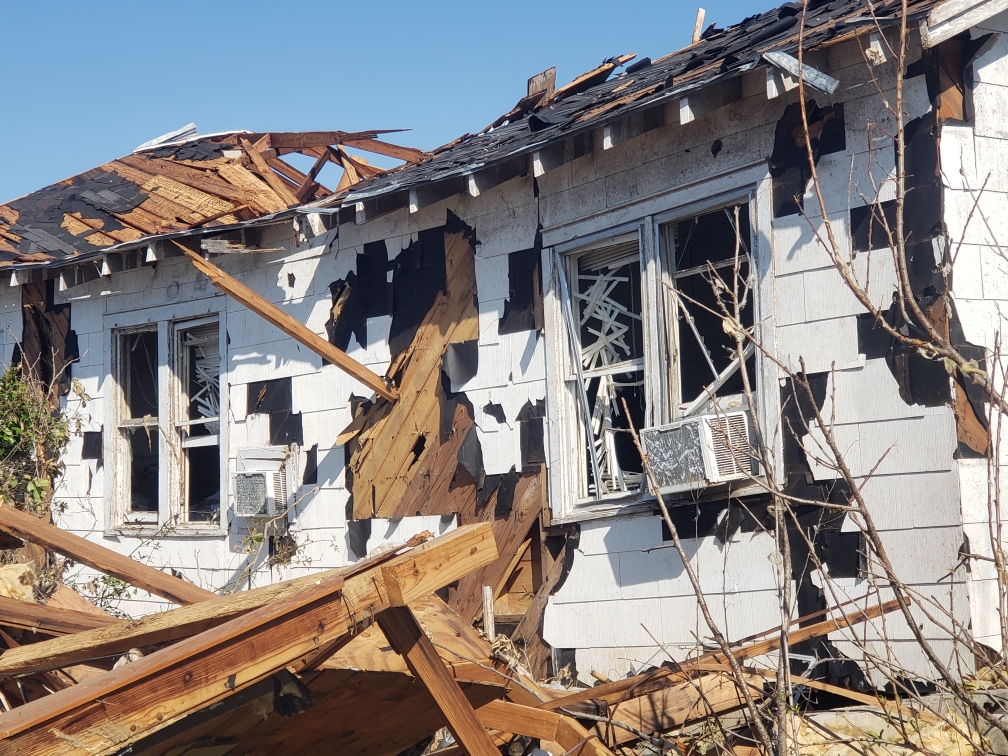
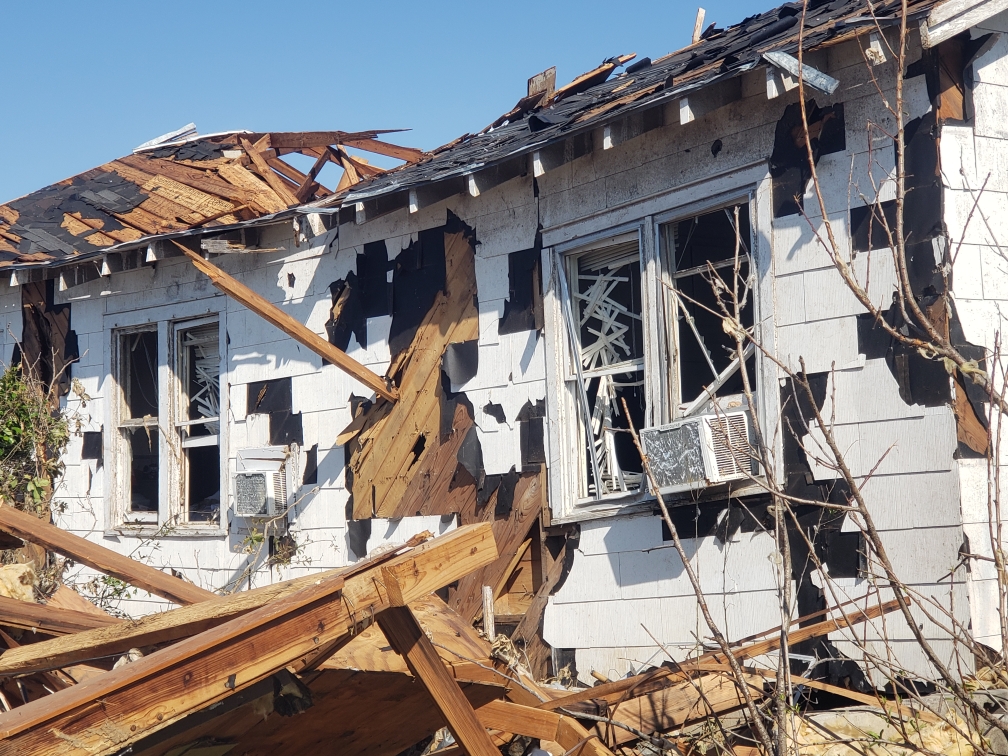
‘Like you were unzipping a jacket’: How survivors barely missed tornado damage, and their next steps for rebuilding
ROLLING FORK – At first, Eddie Jones’ two 5-year-old twin daughters didn’t want to stay with his mother last Friday night.
But after she insisted, the girls complied, and at around 6:30 p.m. they made the short four-block trip to their grandmother’s house.
Now by himself in his Rolling Fork home, Jones, a 50-year-old retiredArmy veteran, anchored his attention to the television, where he was tracking some NBA wagers he placed on a fantasy sports app. With his earpiece clipped in, Jones was talking with his buddies about the night’s games when he heard a strange whistling sound from outside at around 8 p.m.
The whistling turned to a roar, and Jones bolted for the bathroom. He ran so fast he banged his leg on the bathtub before he laid down inside it.
He knew what it was, because a couple hours earlier he saw an alert on his phone about a possible tornado in the area. At the time, he didn’t think much of it, figuring it was just another one of the small storms he was used to. There might be some lightning, some power outages, but things would be fine by the morning, Jones told himself.
“It’s pretty regular around here,” he said later, recalling the warning on his phone. “But things were different this time.”
When asked if he heard a tornado siren or any other kind of alarm from outside his home, Jones said he didn’t hear anything.
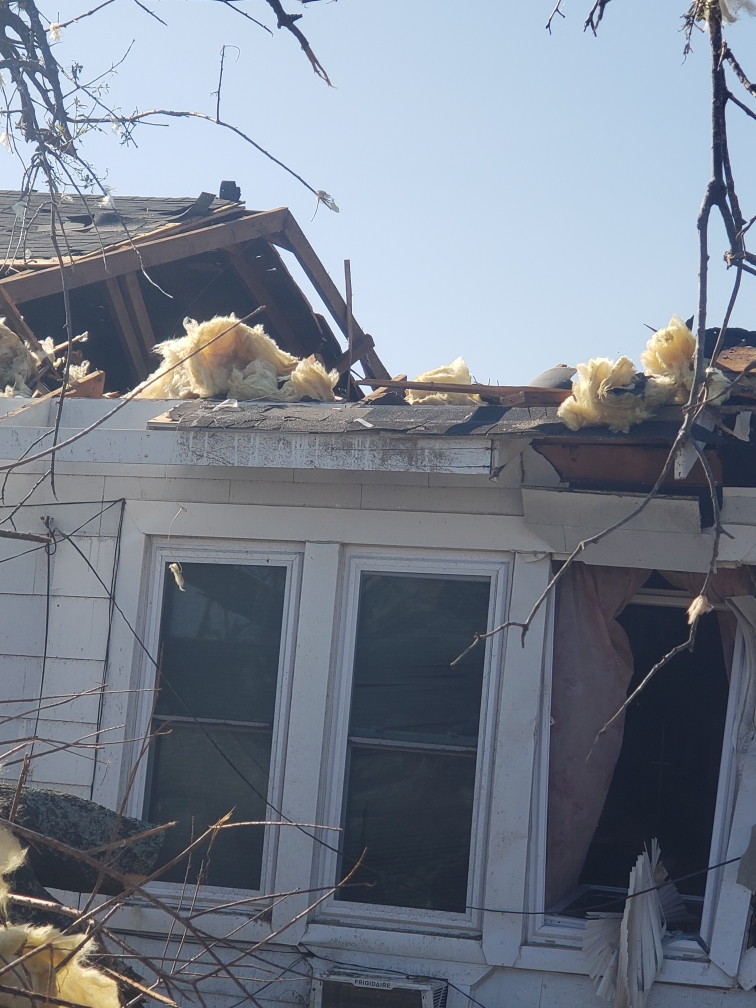
Sharkey County Supervisor Bill Newsom confirmed to Mississippi Today that a siren in Rolling Fork wasn’t working when the storm arrived on Friday. On the county website, a notice about the siren’s repairs says that, in the event of a tornado, a patrol car would drive through the city with its sirens on to warn citizens.
Jones said he didn’t hear that either. Rolling Fork officials couldn’t be reached before this story published. Newsom said a Georgia-based company called him after the storm and said it would install a new siren for free.
While stationed in his bathtub, Jones heard the windows around the house pop.
“The glass was shooting everywhere, and my walls started cracking,” Jones remembered. “It was just like you were unzipping a jacket.”
Laying down, he felt the house lift up into the air and settle back onto the ground.
When the commotion outside died down, Jones looked up to see that his bathroom door had flown off, and his clothes were scattered around the house. He climbed around his belongings and tried to get outside, but the wind was still holding his front door shut. Instead, he ducked outside the one window that wasn’t shattered and made his way to his mother’s house where his daughters were.
Fortunately, her house just four blocks away was untouched.
Jones went back in the morning to check on the damages: The roof was cracked open, tree limbs protruded out of the side of his living room and his car’s windshield. The entire house had shifted a few feet off of its foundation.
But what struck Jones the most was looking to his daughters’ room. He noticed that the wind, after breaking the window, blew debris inside and across the room, shattering a mirror on the opposite wall.
“Had my girls been (home), asleep in their bed, they wouldn’t be here,” Jones said.
Jones and his daughters are still staying with his mother. He said the water pressure at her house finally returned to normal as of Wednesday, a relief after washing himself with baby wipes the last few days, and the power came back on Tuesday.
Now, Jones and hundreds of other Mississippians wait to see what relief will come from the government and charities to help them rebuild.
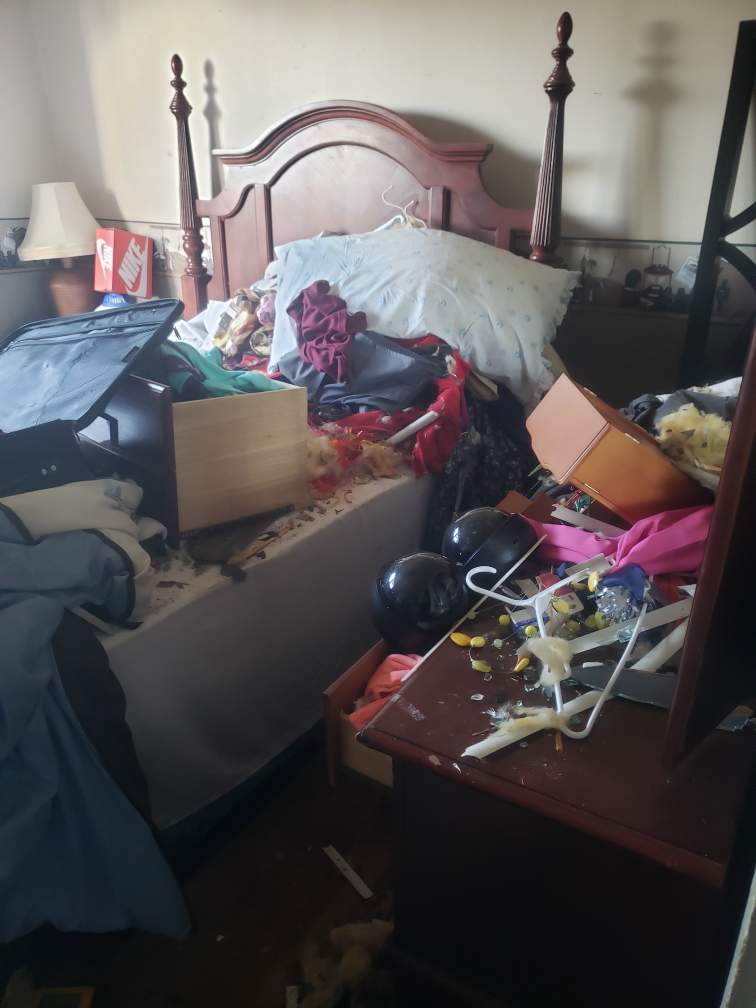
‘It’s going to be a mess‘
Rolling Fork is in Sharkey County, which, with about 4,000 residents, is the second least-populated county in the state. After last weekend’s tornadoes, about a quarter of the county is now displaced from their homes, Mississippi Insurance Commissioner Mike Chaney estimated.
Because President Joe Biden approved an emergency disaster declaration, victims are eligible for grants from the Federal Emergency Management Agency to help pay for temporary housing as well as to rebuild their homes.
The program, FEMA’s Individual Assistance, can kick in if a victim doesn’t have insurance covering storm damage or if the insurance doesn’t cover all of the damages. Victims can also apply for low-interest loans from the Small Business Administration. Receiving an SBA loan and its interest rates are subject to a victim’s credit history, among other factors.
Chaney said it’ll be a challenge to get all of the resources needed from the government to rebuild Sharkey County, where 27% of residents live in poverty and many homes are uninsured.
“For the individuals, the lower income population, they’re not insured,” he said. “A lot of them live in trailers. It’s going to be a mess, it’s going to be hard. The government is going to have to really step in this time.”
Chaney estimated that, between people’s homes and county infrastructure, Sharkey County could be dealing with over $200 million in uninsured losses.
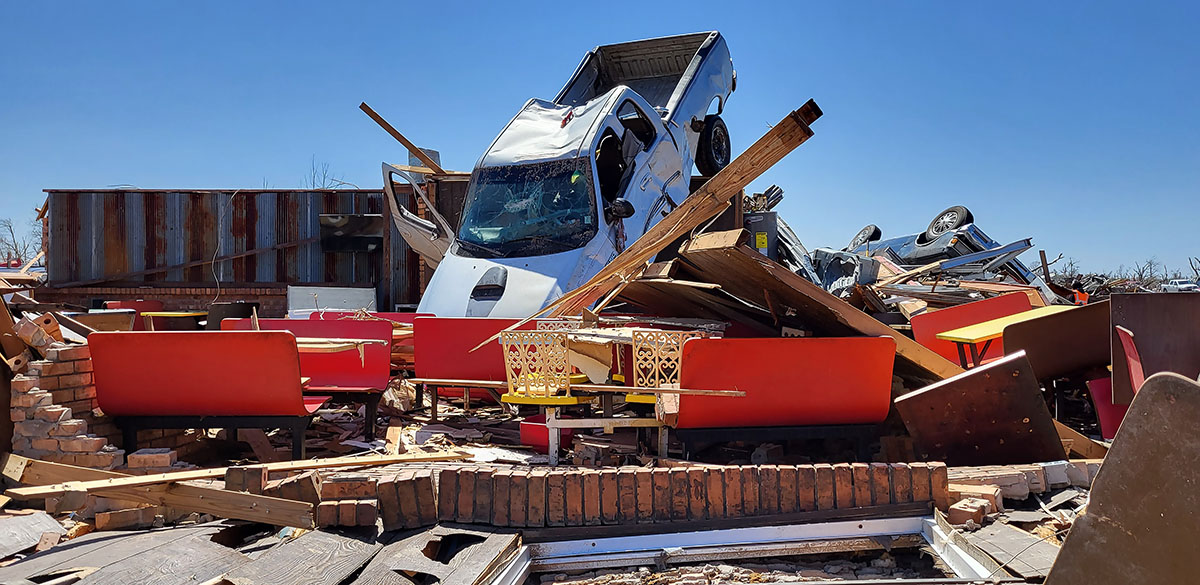
“I’ve never been so stressed in all of my life. I’m usually a strong old woman, but I ain’t that no more,” said Collie Barnes, an 81-year-old lifelong resident of Anguilla, which is just north of Rolling Fork. “I’m just glad to be alive.”
Barnes took refuge with her neighbors, who initially wanted to stay home, in a nearby church after hearing about the storm on the news. She went back to see her porch was missing and water was leaking through the roof, but she realized she was relatively fortunate.
“(Her neighbor) said, ‘I better see if I got a house,’ and she didn’t. It was gone,” Barnes said.
On Wednesday, Barnes and others came to the town hall in Anguilla – which itself is still recovering from a tornado last December – where a FEMA official sat outside, helping victims apply for assistance.
The state hasn’t yet released an official count of total people displaced. While as of Tuesday less than 30 people were staying in shelters, according to the Mississippi Emergency Management Agency, a motel in Greenville is giving over 100 of its rooms for victims to stay in, the Clarion Ledger reported.FEMA is also placing victims in nearby hotel rooms, an agency spokesperson said, adding that anyone affected should either call800-621-3362or visitdisasterassistance.govfor help.
On Thursday, MEMA gave the latest information on damaged homes, deaths and injuries by county:
- Bolivar County: 9 damaged homes
- Carroll County: 24 damaged homes, 5 injuries, 3 deaths
- Humphreys County: 55 damaged homes, 15 injuries, 3 deaths
- Itawamba County: 1 damaged home
- Lafayette County: 2 damaged homes
- Lee County: 10 damaged homes
- Monroe County: 1,476 damaged homes, 55 injuries, 2 deaths
- Montgomery County: 49 damaged homes
- Grenada County: 1 damaged home
- Prentiss County: 1 damaged home
- Panola County: 31 damaged homes
- Sharkey County: 255 damaged homes, 15 injuries, 13 deaths
MEMA spokesperson Malary White said that, as of Tuesday, all missing persons had been accounted for.
So far, FEMA has approved Carroll, Humphreys, Monroe and Sharkey Counties to apply for Individual Assistance. MEMA spokesperson Malary White said more counties could be added as damage assessments continue.
Those counties, as well as Attala, Chickasaw, Clay, Grenada, Holmes, Issaquena, Itawamba, Lee, Leflore, Lowndes, Montgomery, Sunflower, Washington and Yazoo counties are also eligible to apply for SBA disaster loans.
This article first appeared on Mississippi Today and is republished here under a Creative Commons license.
Mississippi Today
Speaker White wants Christmas tree projects bill included in special legislative session

House Speaker Jason White sent a terse letter to Lt. Gov. Delbert Hosemann on Thursday, saying House leaders are frustrated with Senate leaders refusing to discuss a “Christmas tree” bill spending millions on special projects across the state.
The letter signals the two Republican leaders remain far apart on setting an overall $7 billion state budget. Bickering between the GOP leaders led to a stalemate and lawmakers ending their regular 2025 session without setting a budget. Gov. Tate Reeves plans to call them back into special session before the new budget year starts July 1 to avoid a shutdown, but wants them to have a budget mostly worked out before he does so.
White’s letter to Hosemann, which contains words in all capital letters that are underlined and italicized, said that the House wants to spend cash reserves on projects for state agencies, local communities, universities, colleges, and the Mississippi Department of Transportation.
“We believe the Senate position to NOT fund any local infrastructure projects is unreasonable,” White wrote.
The speaker in his letter noted that he and Hosemann had a meeting with the governor on Tuesday. Reeves, according to the letter, advised the two legislative leaders that if they couldn’t reach an agreement on how to disburse the surplus money, referred to as capital expense money, they should not spend any of it on infrastructure.
A spokesperson for Hosemann said the lieutenant governor has not yet reviewed the letter, and he was out of the office on Thursday working with a state agency.
“He is attending Good Friday services today, and will address any correspondence after the celebration of Easter,” the spokesperson said.
Hosemann has recently said the Legislature should set an austere budget in light of federal spending cuts coming from the Trump administration, and because state lawmakers this year passed a measure to eliminate the state income tax, the source of nearly a third of the state’s operating revenue.
Lawmakers spend capital expense money for multiple purposes, but the bulk of it — typically $200 million to $400 million a year — goes toward local projects, known as the Christmas Tree bill. Lawmakers jockey for a share of the spending for their home districts, in a process that has been called a political spoils system — areas with the most powerful lawmakers often get the largest share, not areas with the most needs. Legislative leaders often use the projects bill as either a carrot or stick to garner votes from rank and file legislators on other issues.
A Mississippi Today investigation last year revealed House Ways and Means Chairman Trey Lamar, a Republican from Sentobia, has steered tens of millions of dollars in Christmas tree spending to his district, including money to rebuild a road that runs by his north Mississippi home, renovate a nearby private country club golf course and to rebuild a tiny cul-de-sac that runs by a home he has in Jackson.
There is little oversight on how these funds are spent, and there is no requirement that lawmakers disburse the money in an equal manner or based on communities’ needs.
In the past, lawmakers borrowed money for Christmas tree bills. But state coffers have been full in recent years largely from federal pandemic aid spending, so the state has been spending its excess cash. White in his letter said the state has “ample funds” for a special projects bill.
“We, in the House, would like to sit down and have an agreement with our Senate counterparts on state agency Capital Expenditure spending AND local projects spending,” White wrote. “It is extremely important to our agencies and local governments. The ball is in your court, and the House awaits your response.”
This article first appeared on Mississippi Today and is republished here under a Creative Commons Attribution-NoDerivatives 4.0 International License.
Mississippi Today
Advocate: Election is the chance for Jackson to finally launch in the spirit of Blue Origin

Editor’s note: This essay is part of Mississippi Today Ideas, a platform for thoughtful Mississippians to share fact-based ideas about our state’s past, present and future. You can read more about the section here.
As the world recently watched the successful return of Blue Origin’s historic all-women crew from space, Jackson stands grounded. The city is still grappling with problems that no rocket can solve.
But the spirit of that mission — unity, courage and collective effort — can be applied right here in our capital city. Instead of launching away, it is time to launch together toward a more just, functioning and thriving Jackson.
The upcoming mayoral runoff election on April 22 provides such an opportunity, not just for a new administration, but for a new mindset. This isn’t about endorsements. It’s about engagement.
It’s a moment for the people of Jackson and Hinds County to take a long, honest look at ourselves and ask if we have shown up for our city and worked with elected officials, instead of remaining at odds with them.
It is time to vote again — this time with deeper understanding and shared responsibility. Jackson is in crisis — and crisis won’t wait.
According to the U.S. Census projections, Jackson is the fastest-shrinking city in the United States, losing nearly 4,000 residents in a single year. That kind of loss isn’t just about numbers. It’s about hope, resources, and people’s decision to give up rather than dig in.
Add to that the long-standing issues: a crippled water system, public safety concerns, economic decline and a sense of division that often pits neighbor against neighbor, party against party and race against race.
Mayor Chokwe Antar Lumumba has led through these storms, facing criticism for his handling of the water crisis, staffing issues and infrastructure delays. But did officials from the city, the county and the state truly collaborate with him or did they stand at a distance, waiting to assign blame?
On the flip side, his runoff opponent, state Sen. John Horhn, who has served for more than three decades, is now seeking to lead the very city he has represented from the Capitol. Voters should examine his legislative record and ask whether he used his influence to help stabilize the administration or only to position himself for this moment.
Blaming politicians is easy. Building cities is hard. And yet that is exactly what’s needed. Jackson’s future will not be secured by a mayor alone. It will take so many of Jackson’s residents — voters, business owners, faith leaders, students, retirees, parents and young people — to move this city forward. That’s the liftoff we need.
It is time to imagine Jackson as a capital city where clean, safe drinking water flows to every home — not just after lawsuits or emergencies, but through proactive maintenance and funding from city, state and federal partnerships. The involvement of the U.S. Environmental Protection Agency in the effort to improve the water system gives the city leverage.
Public safety must be a guarantee and includes prevention, not just response, with funding for community-based violence interruption programs, trauma services, youth job programs and reentry support. Other cities have done this and it’s working.
Education and workforce development are real priorities, preparing young people not just for diplomas but for meaningful careers. That means investing in public schools and in partnerships with HBCUs, trade programs and businesses rooted right here.
Additionally, city services — from trash collection to pothole repair — must be reliable, transparent and equitable, regardless of zip code or income. Seamless governance is possible when everyone is at the table.
Yes, democracy works because people show up. Not just to vote once, but to attend city council meetings, serve on boards, hold leaders accountable and help shape decisions about where resources go.
This election isn’t just about who gets the title of mayor. It’s about whether Jackson gets another chance at becoming the capital city Mississippi deserves — a place that leads by example and doesn’t lag behind.
The successful Blue Origin mission didn’t happen by chance. It took coordinated effort, diverse expertise and belief in what was possible. The same is true for this city.
We are not launching into space. But we can launch a new era marked by cooperation over conflict, and by sustained civic action over short-term outrage.
On April 22, go vote. Vote not just for a person, but for a path forward because Jackson deserves liftoff. It starts with us.
Pauline Rogers is a longtime advocate for criminal justice reform and the founder of the RECH Foundation, an organization dedicated to supporting formerly incarcerated individuals as they reintegrate into society. She is a Transformative Justice Fellow through The OpEd Project Public Voices Fellowship.
This article first appeared on Mississippi Today and is republished here under a Creative Commons Attribution-NoDerivatives 4.0 International License.![]()
Mississippi Today
On this day in 1959, students marched for integrated schools

April 18, 1959

About 26,000 students took part in the Youth March for Integrated Schools in Washington, D.C. They heard speeches by Martin Luther King Jr., A. Phillip Randolph and NAACP leader Roy Wilkins.
In advance of the march, false accusations were made that Communists had infiltrated the group. In response, the civil rights leaders put out a statement: “The sponsors of the March have not invited Communists or communist organizations. Nor have they invited members of the Ku Klux Klan or the White Citizens’ Council. We do not want the participation of these groups, nor of individuals or other organizations holding similar views.”
After the march, a delegation of students went to present their demands to President Eisenhower, only to be told by his deputy assistant that “the president is just as anxious as they are to see an America where discrimination does not exist, where equality of opportunity is available to all.”
King praised the students, saying, “In your great movement to organize a march for integrated schools, you have awakened on hundreds of campuses throughout the land a new spirit of social inquiry to the benefit of all Americans.”
This article first appeared on Mississippi Today and is republished here under a Creative Commons Attribution-NoDerivatives 4.0 International License.![]()
-

 Mississippi Today6 days ago
Mississippi Today6 days agoLawmakers used to fail passing a budget over policy disagreement. This year, they failed over childish bickering.
-

 Mississippi Today6 days ago
Mississippi Today6 days agoOn this day in 1873, La. courthouse scene of racial carnage
-

 Local News7 days ago
Local News7 days agoAG Fitch and Children’s Advocacy Centers of Mississippi Announce Statewide Protocol for Child Abuse Response
-

 Local News6 days ago
Local News6 days agoSouthern Miss Professor Inducted into U.S. Hydrographer Hall of Fame
-

 News from the South - Alabama News Feed4 days ago
News from the South - Alabama News Feed4 days agoFoley man wins Race to the Finish as Kyle Larson gets first win of 2025 Xfinity Series at Bristol
-

 News from the South - Alabama News Feed5 days ago
News from the South - Alabama News Feed5 days agoFederal appeals court upholds ruling against Alabama panhandling laws
-

 Our Mississippi Home7 days ago
Our Mississippi Home7 days agoFood Chain Drama | Our Mississippi Home
-

 News from the South - North Carolina News Feed7 days ago
News from the South - North Carolina News Feed7 days agoHelene: Renewed focus on health of North Carolina streams | North Carolina


















































